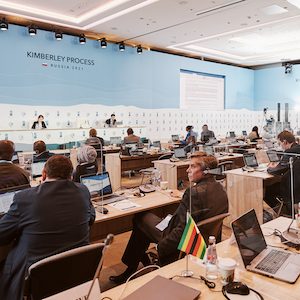
Botswana’s new president, Duma Boko (pictured), said he hopes his country will finalize a contract with De Beers soon—but intimated that negotiations over the long-delayed deal had broken down.
“As matters stand, [De Beers is] thinking of walking away, not signing at all,” Boko said at a press conference following his swearing-in on Nov. 1. “[That] is a very dangerous position to be in as a country.”
De Beers and Botswana signed an agreement in principle for a new 10-year deal in June 2023, and then a “head of terms” in October of that year. A final contract has yet to be signed, however.
“We will try to reach out as quickly as possible to engage with our partners and ensure an agreement is signed,” Boko told reporters.
He added that talks may have been affected by the heated atmosphere surrounding them.
“We need to moderate, always mediate, our representations with civility and respect, moreso in a commercial setting that plays out in the full view of…local, regional, and international media,” said Boko. “Certain pronouncements [create] uncertainty and unease among investors, and when that happens there is a whole cascade of outcomes, some of which we experience now.
“When we go to the negotiating table, we go there appreciating that a negotiation involves a two-way engagement,” he continued. “Each party must move, concede some inches of the ground, in the direction of finding each other either at the midpoint or at some reasonably agreeable level.
“A proper negotiation involves compromise, where you get a bit of what you wanted, the other person gets a bit. You both lose, you both win. Then you know you have a durable, sustainable agreement. These are basic principles of negotiation. We will engage along these lines.”
He noted that Botswana was still heavily dependent on diamond revenue.
“We want to safeguard the goose that lays for us the golden egg, in the short term to medium term, so we have some revenue generated, while we then look at [ways to diversify] the economy,” Boko said.
“We don’t operate in an economy in isolation. We compete in a global setting. Right now we’ve seen a shift that will be economically devastating if it not addressed, toward Angola as the epicenter of the diamond industry. We need to claw it back. We need to create an environment that creates investor satisfaction, investor confidence.”
Analyst Paul Zimnisky tells JCK that De Beers may feel it’s being asked to make too many concessions—at a time when its business is also shaky.
“There does seem to be a line that De Beers is holding,” Zimnisky says. “An imbalance to the agreement could be detrimental to the longer-term viability of the [De Beers–Botswana] joint venture, and perhaps Botswana is really pushing up against that this time, although it’s hard to know for sure. But the reality is a strong and healthy De Beers is probably good for Botswana as well, and it seems like the president acknowledged that, which is encouraging.”
Botswana and De Beers are 50/50 partners in Debswana, the company’s primary miner. Botswana is also 15% owner of De Beers, which has been put up for sale by majority owner Anglo American.
Boko did not mention former president Mokgweetsi Masisi’s plan for Botswana to acquire 49.9% of diamond manufacturer HB Antwerp (it originally intended to take a 24% stake).
HB Antwerp cofounder Rafael Papismedov tells JCK he expects to speak with the new administration soon.
“We will meet them, and we will engage in discussions. Botswana is a democracy, and it experienced a friendly handover. We look forward to meeting with them,” says Papismedov.
“Our business model, our technology, the higher wages we’re paying—all of this was appealing to the previous regime, and I’m sure it will be appealing to the new regime.”
(Photo from Facebook)
- Subscribe to the JCK News Daily
- Subscribe to the JCK Special Report
- Follow JCK on Instagram: @jckmagazine
- Follow JCK on X: @jckmagazine
- Follow JCK on Facebook: @jckmagazine





